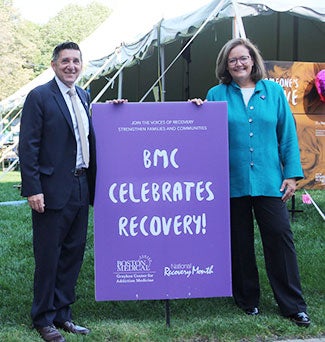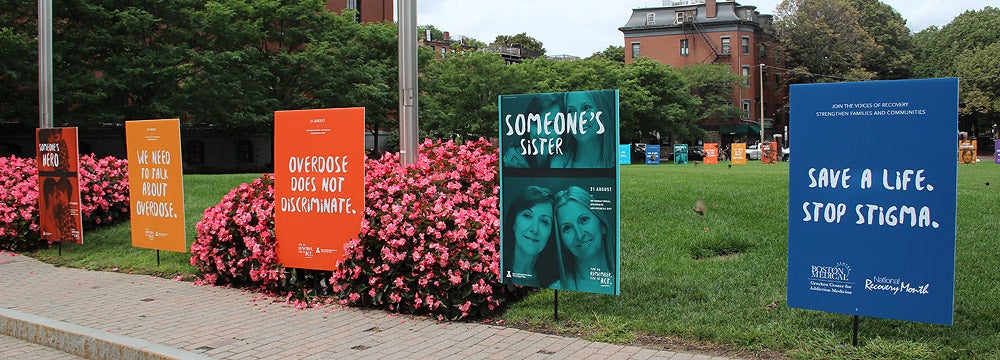
Michael Botticelli, Executive Director of the Grayken Center at BMC and Kate Walsh, president and CEO of the Boston Medical Center
A young woman, just 22 years old, is losing her fight with addiction. She can’t break from the lifestyle or sustain a job. Her mother has custody of her beloved three-year-old daughter. Her situation may have appeared hopeless 20 years ago, but today that same individual can go on to celebrate decades of recovery, hold a professional job, raise her children, and even help others to reach long term recovery.
Because so many still see it as a “choice,” addiction has not always received the medical attention it deserves. In reality, addiction should be viewed as what it is: a chronic disease. A chronic disease is defined by the U.S. National Center for Health Statistics as a condition that lasts three months or more, has long-lasting effects, and can rarely be treated with medication alone. A recent study from the National Center for Biotechnology Information (NCBI) indicates that long-term drug abuse (more than a year) exceeds rates of drug dependence. When addiction is treated like a chronic disease, with a schedule of treatments and an understanding that the illness is going to remain prominent for some time, long term recovery is attainable.
We don’t need to let people hit rock bottom before we motivate them to seek care. We don’t let people with hypertension progress to where they have cardiac arrest before we do interventions.
Like diabetes, addiction is often an inherited disease. Studies have found that genetics play a role in 50% of addiction cases. Diabetics are also closely monitored from an early age, yet individuals with genetic predispositions to substance use disorders (SUD) receive no such observation, preventative treatment or education. Unfortunately, most healthcare providers and centers have not been trained to treat addiction as a disease. And, because of the stigma associated with it, only 14% of those with SUD receive treatment, as opposed to 75% of those who suffer from diabetes.

Models of Care: Treating Substance Use Disorders
The good news is there are models of care for treating substance use disorders, and they work. For example, Office Based Addiction Treatment (OBAT) allows individuals to receive medication and care for substance use disorders. The program relies on nurse care managers to ensure delivery of high-quality addiction treatment in an outpatient, doctor’s office setting. Started at Boston Medical Center, the program was so successful it has been replicated throughout Massachusetts and in centers across the country.
As more healthcare providers and delivery systems care for patients with SUD, doing so using programs like OABT can open the doors to treatment for many patients while reducing the stigma associated with this disease.
Michael Botticelli, Executive Director of the Grayken Center at Boston Medical Center, puts it succinctly: “We don’t need to let people hit rock bottom before we motivate them to seek care. We don’t let people with hypertension progress to where they have cardiac arrest before we do interventions.” Recently interviewed in CommonWealth, Botticelli, in long-term recovery from substance use himself, has also wondered why his very own pediatrician didn’t recognize his genetic potential for alcoholism. Had the doctor done so, Botticelli may have avoided this painful and dangerous period in his life.
Long-term recovery of SUD
In addition to treating SUD like other chronic diseases, family and social support have a big impact on people’s ability to stay in long-term recovery. Family and friend support for someone battling addiction isn’t just important—it’s essential. Studies indicate the support of family members not only plays a critical role in helping the individual, this inclusion greatly benefits the entire family. BMC’s Grayken Center researchers Alicia Ventura, MPH, and Sarah Bagley, MD, recently published findings in the Journal of Addiction Medicine that demonstrate "family-based models are recognized as among the most effective approaches for treating both adults and adolescents with drug problems."
The authors also indicate that addictive health negatively impacts family members more than was once thought. Adults and children with family members who have substance use disorders actually have a higher risk of developing chronic medical and psychiatric health conditions themselves, leading to higher healthcare costs than those faced by people without family members with substance use disorders. To reverse this trend, it’s important to allocate funds to evidence-based, family-centered interventions to increase awareness about the process and success of long-term recovery.
Long-term recovery of SUD rests on building blocks and measured steps. For example, an individual who can stick with a treatment program for one year is much more likely to achieve lifelong recovery than someone who drops out. An active support system of family and friends is a vital part of achieving that important one-year anniversary.
As national experts who have treated and studied substance use disorders for 25 years, Boston Medical Center’s staff has emerged as a national leader in the discussion of immediate treatment techniques and subsequent long-term recovery.
The Grayken Center for Addiction supports 18 programs dedicated to people with SUDs. The Center has taken an interdisciplinary approach to look at and treat addiction holistically, from genetic foreshadowing to long-term recovery.
It remains essential that we all look carefully around our own social circles and beyond to see where we can offer support to someone we know who is in need. Visit the BMC’s Grayken Center website to learn how you can offer support to someone on the long road of recovery and eliminate the stigma of addiction for good.
Media Contact:
mediarelations@bmc.org en
en 
 Français
Français Deutsch
Deutsch Italiano
Italiano Español
Español Tiếng Việt
Tiếng Việt Kreyol ayisyen
Kreyol ayisyen